October – Breast Cancer Awareness Month (No, We Didn’t Forget)
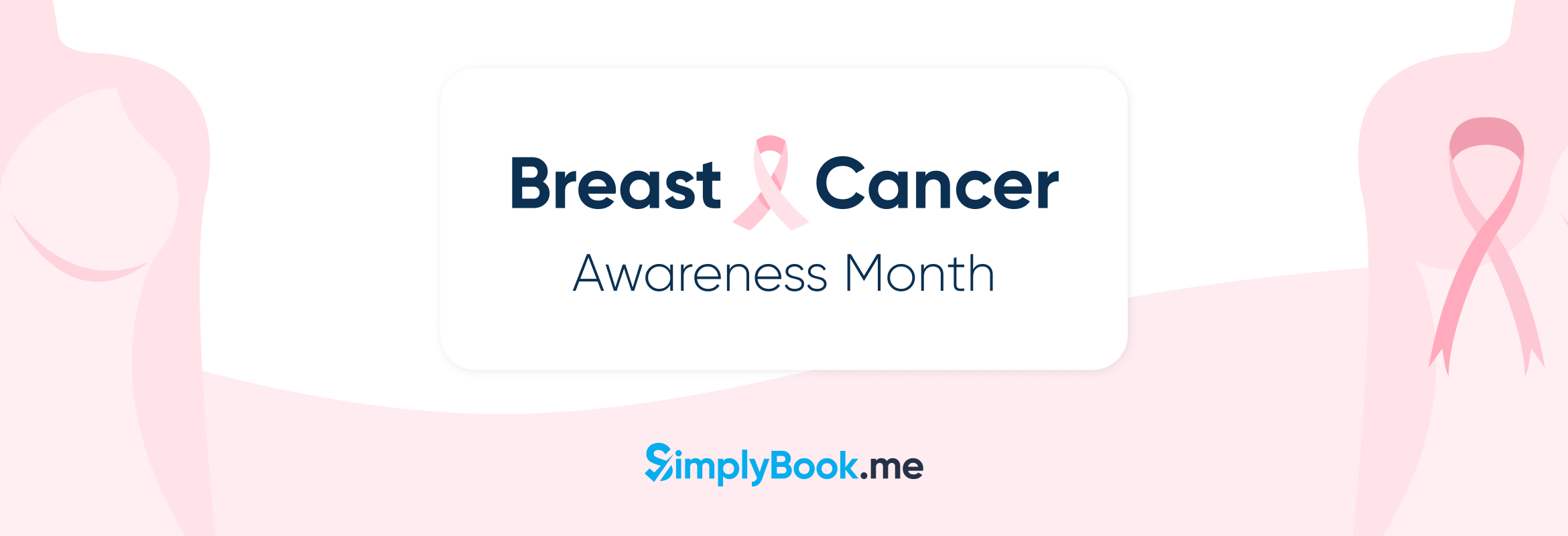
This post is also available in:
![]()
![]()
![]()
![]()
Monday, the 31st of October, will signify the end of Breast Cancer Awareness Month. Since that will compete with the Halloween scare-fest, we decided to say something today.
Perhaps we should have started the month with some essential and profound insight and information distributed throughout the month. However, in the often-heard reason for not getting a mammogram or not getting that lump checked, we got distracted, and life and work got in the way.
It’s almost poetic that we got distracted by moving premises, new beginnings and new projects. How many women have noticed something amiss and ignored it as nothing or decided to put off seeing a doctor until “after the kids are back at school”, “after the holidays”, or “when this work project is finished”?
And how many women have discovered, too late, that putting off that visit significantly reduced their chances of survival?
So while we might be a little late to the party, we still turned up in time to make a stand in bringing breast cancer awareness, funds, and a month of information into a single post. And as a (slight) majority female workforce, we really ought to be on top of this.
Breast Cancer Will Affect You
No, I’m not saying that you will get breast cancer. Still, according to world statistics, 1 in 8 women will receive a breast cancer diagnosis. Now think about how many women you know.
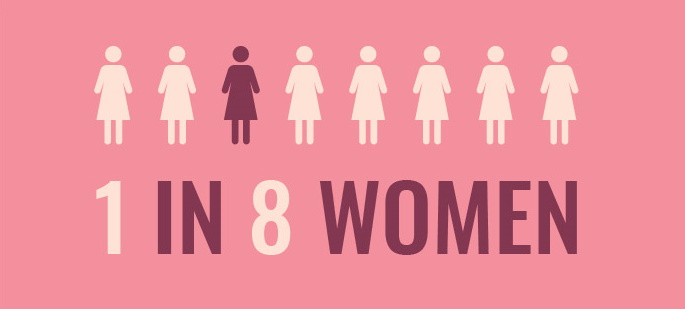
How many women in your social, familial and professional lives are statistically likely to be impacted by a breast cancer diagnosis? It might not directly impact your life, but how would you deal with a friend or family member being given a potentially life-threatening cancer diagnosis? How would you treat a colleague suffering through a similar situation?
As any cancer survivor will tell you, it doesn’t just affect the individual but all of their close circle of family and friends.
Bringing Breast Cancer Awareness – Not Fear
No one wants to spread fear and dread among the female population. That’s not what Breast Cancer Awareness Month is about. It’s about empowering women to look after their breast health with the information and confidence to fight for the medical screening and care they deserve. It’s also about supporting women affected by and living with breast cancer.
So let’s start with the best way to keep on top of your breast health and stay alert for the early symptoms of breast cancer.
Breast Health & Self-Examination
How many women actually carry out a monthly breast self-examination? Unless they have a family history or a genetic marker in their DNA, the number of women who do is astoundingly low. Now in itself, this is not a problem because, since 2011, doctors have not recommended self-examination in conjunction with a regular mammogram screening.
However, if women don’t have a comprehensive insurance plan or their social medical care doesn’t cover screening for them (women under 45 and over 70), how else are they supposed to keep on top of their breast health? Some cancers, such as Inflammatory breast cancer, can show up very quickly without warning from the mammogram they had 9 months ago.
There is also such thing as checking too frequently as subtle changes can be missed when you see or feel them too often – they become the norm. The current recommendation from Breast Cancer Organisations is once per month. For a step-by-step process, this article about self-examination is very informative.
Of course, you can’t go through looking after breast health without looking after the whole body, so there are also some lifestyle changes that could reduce the risk of developing breast cancer.
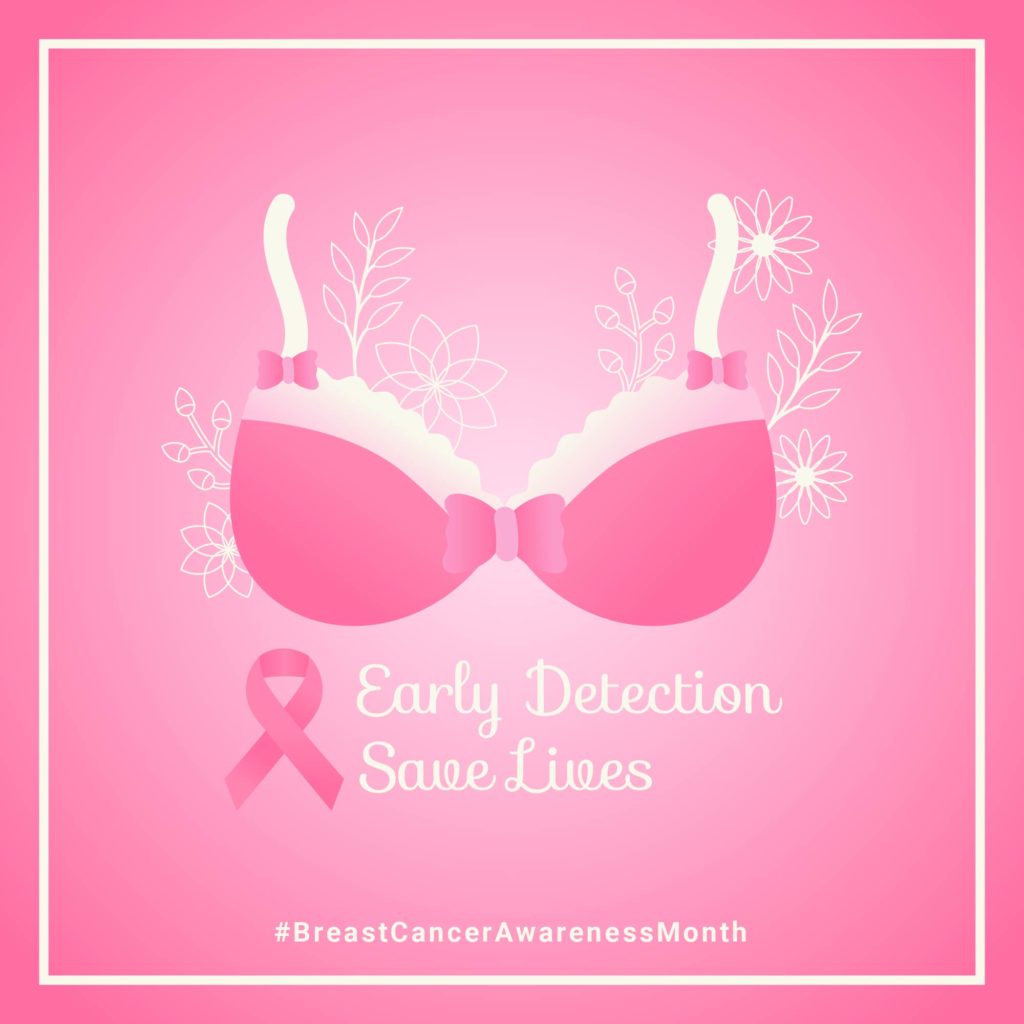
Identifying Early Signs of Breast Cancer
If you have already seen the information on how to self-examine your breast, it’s a good idea to know what you are looking for.
What are signs and symptoms that you should always have checked by your healthcare professional:
- A Change In How The Breast Or Nipple Looks Or Feels
- A Change In The Breast Or Nipple Appearance
- Any Nipple Discharge—Particularly Clear Discharge Or Bloody Discharge
Just because you find a lump or bump doesn’t mean you have breast cancer, but it’s still a good idea to get it checked out by a doctor.
How to Support a Friend, Family Member, or Colleague
Any kind of cancer can be debilitating, but with breast cancer, many women find it difficult to separate their worth from their physical appearance. Of course, not all breast cancer requires a mastectomy, but even the possibility can destroy a woman’s confidence. Moreover, when a person finally comes to terms with their diagnosis and feels that they need to tell their friends, family and even co-workers, it can feel like a huge elephant in the room, and no one knows how to deal with it.
That’s why you should look up how to speak to and support your friends, even when you don’t know what to say.
This Instagram post from the National Breast Cancer Foundation is perfect for finding the best way to support your cancer-suffering fellow humans.
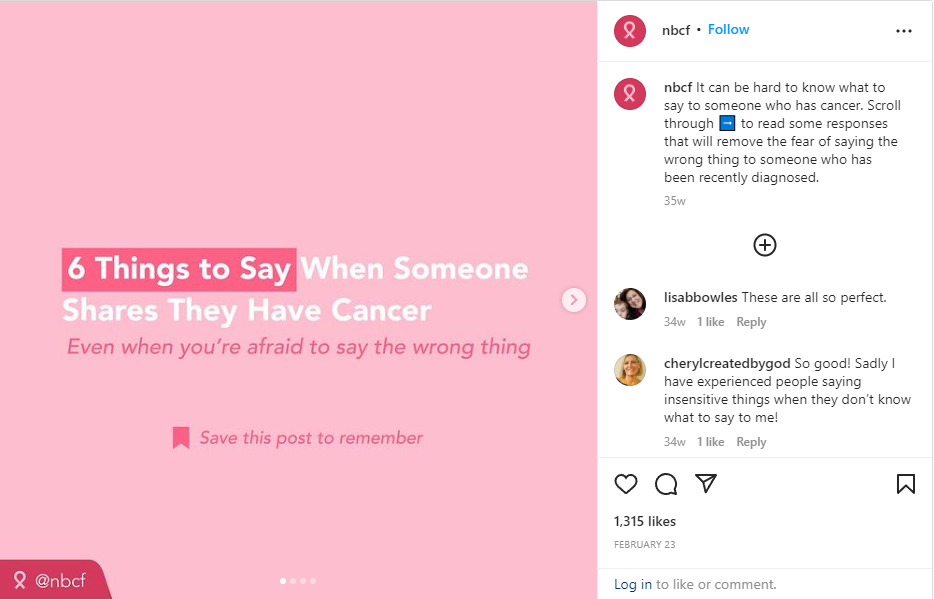


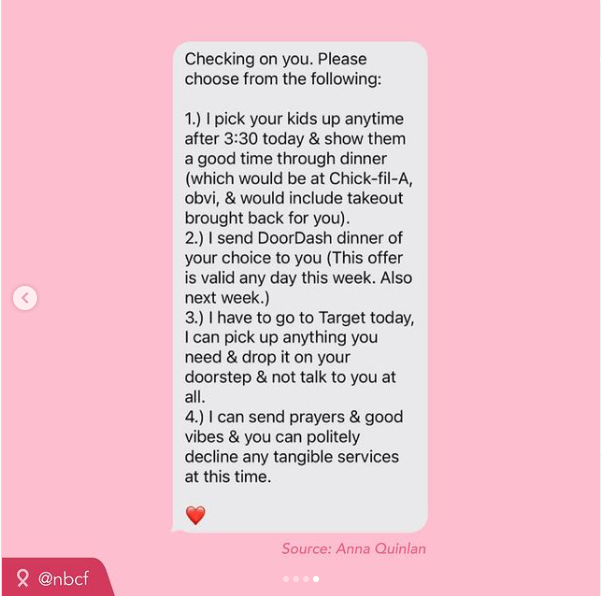
To Finish Off…
I might not have been the first person to the party this October, but that doesn’t mean I am any less invested in creating breast cancer awareness. While I have no history, I still need to make sure I take care of my breast health. Statistically, only 5-10% of people diagnosed with breast cancer have a family history of the disease.
I have donated to the cause, and I hope you do too. Moreover, you don’t have to have funds to donate, you can offer your time and skills to fundraising and supporting Education, Screening and Patient Support.
In addition, I have also promised my family that I will begin an annual breast screening programme and get a regular mammogram. I might not be eligible just yet, but I have a family. And looking after my health means I’m still around to take care of them.
Below are just a few of the users that use SimplyBook.me for their medical health-associated business, support, counselling, and other services:
Pink Ribbon Pilates – a pilates class designed to work with women in various different stages of their breast cancer diagnosis and allow then to keep active in a healthy and positive way.
My Reflection – a business providing custom-made breast prostheses for women who have undergone a mastectomy.
Ámate Cuida Tu Salud – Ámate is an APP that facilitates women’s access to breast and cervical screening services provided by health centres in Colombia.
Amélie’s Follies – A well-fitting bra can be essential to our health, and as well as the usual fittings, this wonderful place has a comprehensive pre and post-op fitting service that will help you



Comments
0 commentsNo comments yet